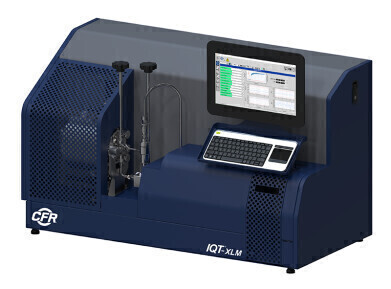Measurement and testing
Ignition Quality Tester enables higher measurement limits for cetane measurements of renewable diesel
Aug 15 2023
Production and demand for renewable diesel continues to expand as government low-carbon fuel policies incentivise the use of fuels with low life cycle CO2. Renewable diesel also has ultra-high cetane values, often exceeding 70 CN. This enables the blending of renewable diesel with conventional diesel to offer both lower carbon and higher cetane. Accurate and consistent (precise) cetane certification is needed for the monetary worth of renewable diesel to be fully realised. Valid cetane measurements for these fuels require a test method with scope upper limits that are high enough to include such high cetane levels.
The European Committee for Standardisation (CEN) recently published a revised version of IQT test method EN 15195. In EN 15195:2023, the upper limit for the Derived Cetane Number (DCN) listed in the scope of the method has been increased from 71 DCN to 76.8 DCN. CEN implemented this increase in the scope based on data for high cetane samples that were tested in interlaboratory programs operated by the Energy Institute (EI) DCN correlation scheme and the ASTM National Exchange Group (NEG). The change will also be adopted in the scope of IQT test method IP 498.
As specified in ISO 4259, single test results are deemed to be valid up to the higher method scope limit plus 1.2R, or 81.15 DCN in the case of EN 15195. Thus, the IQT, from CFR Inc., is suitable for certification testing of all ultra-high cetane diesel fuels such as Hydrotreated Vegetable Oil (HVO) renewable diesel and Gas-to-Liquid (GTL) diesel. IQT users are advised to contact CFR Engines Canada ULC to receive software updates to properly implement the expanded scope.
CEN also recently published a revised version of the European standard that applies to renewable diesel fuels: EN 15940, “Paraffinic diesel fuel from synthesis or hydrotreatment”. This standard covers fuel types such as HVO and GTL and specifies a minimum cetane number of 70 for Class A fuels. IQT test method EN 15195 was the “referee” test method for cetane (the method to be used in cases of dispute concerning cetane number) in earlier versions of EN 15940, and it remains the referee method in EN 15940:2023.
Digital Edition
PIN 26.1 Feb/Mar 2025
March 2025
Analytical Instrumentation - Elemental Analysis for Quality and Process Control at Refineries, for Lubricants and Wear Metals in Engine Oils - Synthetic Lubricants: New Developments - Scaling...
View all digital editions
Events
Mar 17 2025 Houston, TX, USA
Mar 18 2025 Beijing, China
Mar 19 2025 Manila, Philippines
Mar 20 2025 Brussels, Belgium
Mar 20 2025 Guangzhou, China


.jpg)



.jpg)



.jpg)








